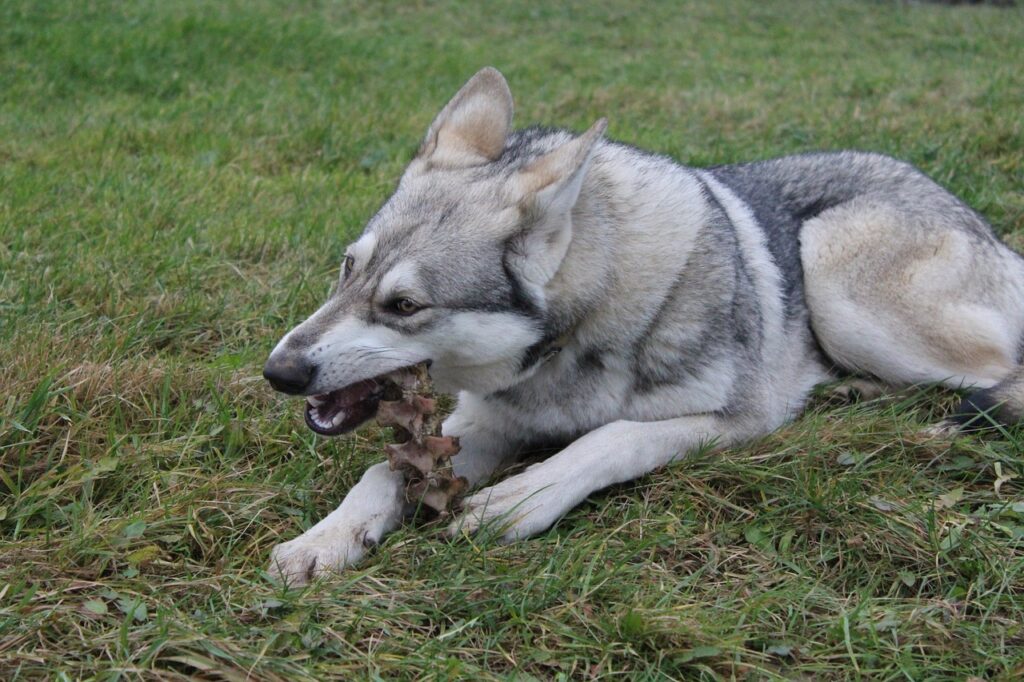Should you give marrow bones for dogs as a recreational chew? Are marrow bones for dogs safe to chew? That’s definitely a bone of contention in the dog world!
First, the easy answer: you should never give your dog cooked bones. The cooking process dehydrates the bones, making them far more likely to splinter and break. Splintered bones can puncture an organ and lead to life-threatening complications.
Beyond that, though, things get a little stickier with both pros and cons to giving your dog marrow bones. We’ve got the pros and the cons below–based both on our personal experience and on veterinary advice–so that you can make the best decision for your dog.
Are Frozen Marrow Bones Safe For Dogs?

Freezing bones makes them very hard and your dog will most likely crack his teeth as he tries to crack through them.
Besides, old bones could also be laden with bacteria which could result in all manner of health issues.
When bones get too hard, they can easily splinter and those splinters could easily puncture an organ. Cooking the bones has the same effect.
This is why it is best to serve the bones raw—right after treating them in salted water.
Since the treatment involves freezing, make sure the bone thaws first before you give it to your dog.
First…
Before cooking marrow bones, you need to know where to buy marrow bones and how to purchase the best.
Local butchery or raw food co-op is the first place dog parents turn to.
You can also purchase marrow bones from Amazon.
One good thing about bone for dogs from Amazon is that retailers on the platform have done the hard work of choosing the best bones for your dog.
Some of the bones that they stock have also been professionally roasted for better taste and maximum nutrition for your dog.Check out this post for the best smoked bones for dogs on Amazon right now: Best Smoked Bones for Dogs
Irrespective of where you decide to buy your marrow bones, remember to choose bones that are safe for your dog.
In particular, ensure that the bones are appropriate for your dog’s age and breed.
Let’s explain this a bit:
For puppies, avoid marrow bones from hard-to-chew bones until all the puppy teeth have been replaced with adult teeth.
And if you have a puppy that’s new to the family and you aren’t familiar with his chewing style, consider getting softer marrow bones.
If you have senior or elderly dogs, go for softer marrow bones as well because such dogs often suffer from brittle teeth or worn-out teeth (due to life-long use).
Medium to large dog breeds like German shepherds, Great Dane, Labradors, Dobermans, etc should be given marrow bones that are large enough so that they don’t chew and swallow them, causing chocking hazards.
Go for Jumbos, cut femurs, and knuckles if you have such dogs.
Things like chicken bones, lamb or pork are too small and brittle for larger dog breeds and should be avoided as they can easily swallow them, causing intestinal blockage.
As a general guide, ensure that the marrow bone you choose for your dog doesn’t fit inside his mouth.
In other words, the marrow bone should be larger than your pup’s muzzle, making it impossible for him to swallow it whole.
Brachiocephalic breeds like bulldogs, Shih Tzu, pugs, and boxers are not physically designed to chew bones safely and effectively.
If you own such dogs, just avoid bone marrow treats altogether. Consider giving them something like a Kong toy as a substitute or bone broth (without bones).
Related Post: Barrel Chest Dog Breeds
Your Dog Vomiting After Eating Marrow Bone: What ShouldYou Do?

If your dog ate too much bone marrow, he might develop an upset stomach and start vomiting. This is because bone marrow contains a lot of fats which when ingested can cause stomach upsets.
There are also other causes of vomiting aside from the excess fats.
Below are some of the most common causes of vomiting and what you should do in each instance.
This is stomach inflammation caused by abrupt changes in diet.
Your dog can develop this condition and start vomiting if the dog isn’t used to consuming marrow bones regularly.
In most cases, this condition occurs when you give your dog marrow bones for the first time.
All you have to do is to give your dog time for the inflammation to subside after which you can give him an upset stomach bland diet.
Sometimes your dog may swallow a bone, which blocks thepassage of food. This implies that the dog will vomit the food after a fewminutes or even hours.
If your dog has swallowed a bone, you ought to inspect their stool for the ingested bone.
If you don’t find anything, you should consult a veterinary doctor for medication. In most cases, your dog may require surgery to remove the bone.
Some bone fragments are not digestible. When your dog ingests them, they settle in the stomach.
Your dog may feel fine, but by midnight or the following day, the dog may start vomiting these fragments.
Sharp fragments can also scrape the lining of the esophagus and cause blood spots.
In cases where the fragments perforate the lining of the abdominal cavity, commonly referred to as peritoneum, you will need to consult a vet immediately. This condition can be life-threatening if not well managed.
FAQ
Do you have to cook marrow bones for dogs?
Can you give dogs raw marrow bones?
How do you soften marrow bones for dogs?